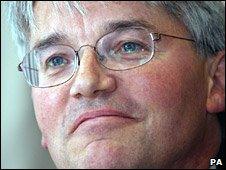Aid watchdog will reassure taxpayers, says Mitchell
- Published

Mr Mitchell said his department did "huge good"
Britain's £7.3bn overseas aid budget must be seen to be "well spent" if "hard pressed taxpayers" are to support it, says Andrew Mitchell.
The international development secretary was speaking ahead of a speech outlining plans for a new aid watchdog.
He told the BBC British-backed aid was "vital" but taxpayers must see they are getting value for money.
Aid funding is being protected but ministers say it must be refocused on priorities like preventing disease.
'Value for money'
In his first big speech since becoming International Development Secretary Mr Mitchell said that information on all overseas aid would be published on his department's website.
He told BBC Radio 4's Today programme: "We will never maintain public support among hard pressed taxpayers for this vital and large programme unless we can demonstrate independently that when we spend £1 on development we are actually getting 100 pence of value.
"We need to move the whole approach of aid and development towards looking at the results, what we are actually achieving on the ground, and away from an approach which is too dominated by impact and putting money on the table."
He said they were "miles off course" when it came to meeting UN Millennium Development Goals: "We have to focus very specifically on how we get back on course, particularly on maternal mortality which is perhaps the most off course."
In recent years Britain had done well at giving money directly to governments it trusted to act with "probity", he said, but he thought that had gone "too far" and the government wanted to see if it could make it more efficient.
He said support for the "huge" international aid budget depended on the government being able to demonstrate that it was being "well spent" - but denied that a new watchdog would mean creating a new level of bureaucracy.
Quangos
All the main political parties support a pledge to increase spending on international aid to 0.7% of national income by 2013.
And Mr Mitchell told the BBC the Department for International Development was "highly respected" around the world and was doing "huge good in many very difficult places".
But he has axed some UK-based "awareness projects" and frozen all others while they are reviewed.
He also said: "We are going to look very carefully at every single programme around the world over the course of this summer."
Mr Mitchell defended the setting up of a new body at the same time as the new government has been criticising the number of existing quangos.
He said: "We're going to be very careful indeed that we don't introduce a whole tier of new bureaucracy but that we get what we require, which is confidence among taxpayers through this independence, that the money is really being well spent, while also learning the lessons through this independent evaluation about what works and doesn't work in development."
In a Commons debate on Thursday shadow foreign secretary David Miliband urged Mr Mitchell to reconsider phasing out aid to Russia as it was "extremely riven with human rights abuses".
"Relatively small amounts of DFID money... was doing important work in supporting human rights issues [under Labour], which the foreign secretary said in his speech was going to be a vital part of the work in his department," he said.
Mr Mitchell said before the election a Conservative government would end aid to Russia and China to concentrate on the poorest countries.